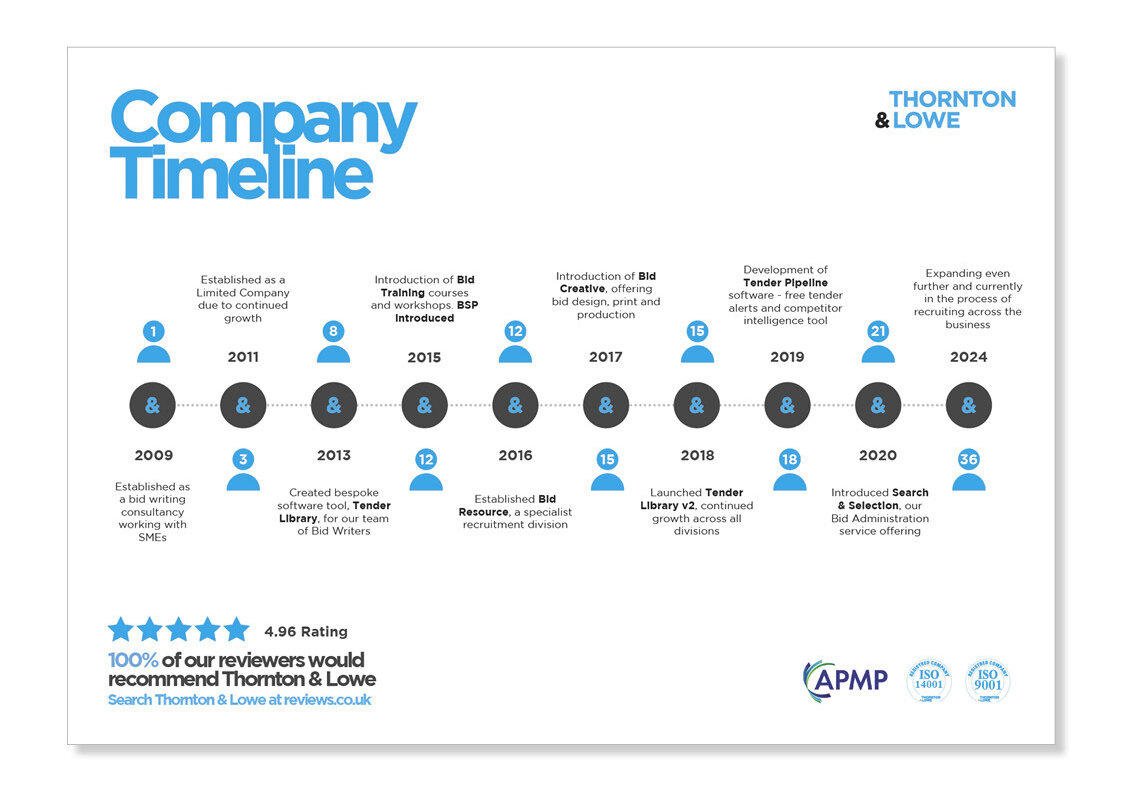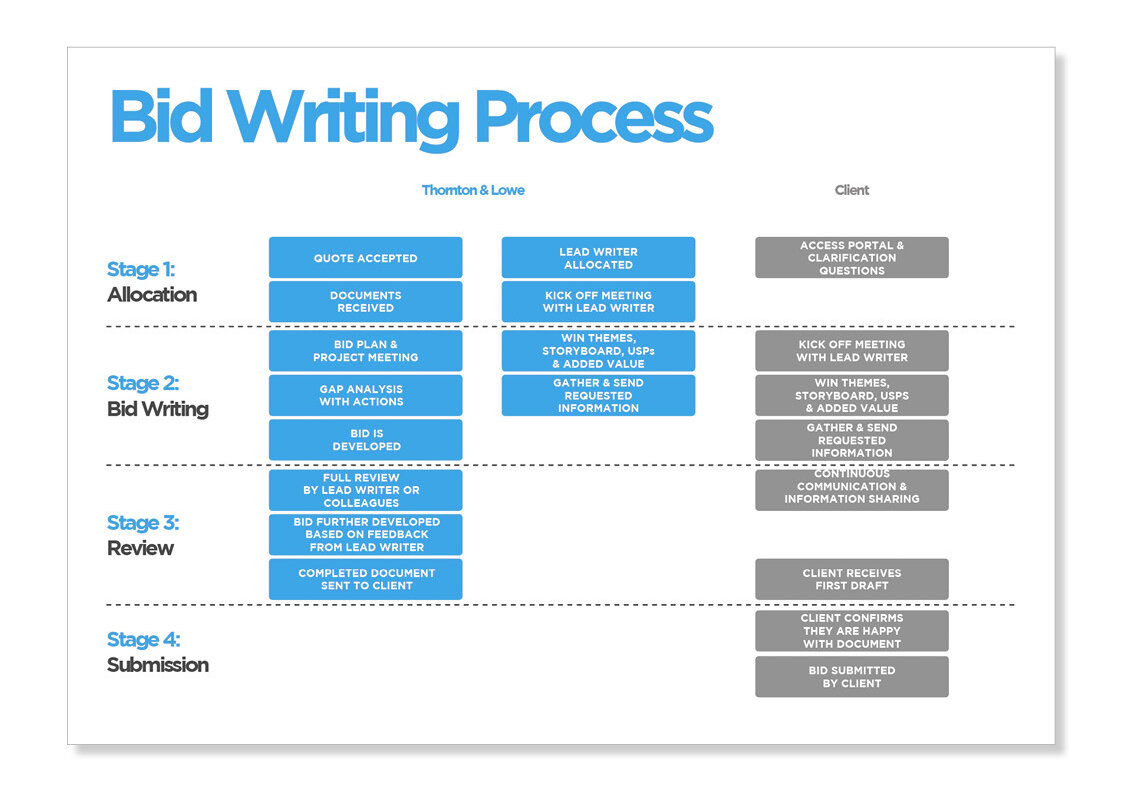Complete Tender Management
Complete tender management is a system which will markedly enhance a company's ability to win contracts and advance its business objectives. With tendering processes becoming increasingly complex, incorporating a multifaceted approach that spans bid management, the drafting of compelling tender documentation, and the strategic involvement of subject matter experts (SMEs), is essential. Understanding the intricacies of the tender management lifecycle, from the initial request for proposal (RFP) to the final bid submission, cannot be overstated.
In a crowded marketplace, it is those businesses which embrace complete tender management and continually invest and refine their bid writing skills who stand out.
Highlighting the importance of efficient bid management processes, this article will provide valuable insights and actionable strategies for businesses aiming to excel in tender management. By demystifying the complexities of the tendering process and presenting a coherent roadmap, we aim provide you with the knowledge and tools necessary for achieving excellence in complete tender management.
You may also find our Bid Writing Ultimate Guide useful.
Have a live tender? Need a quote?
Contact our Tender Management TeamThe Tender Management Lifecycle
Complete tender management includes the full lifecycle of bidding. It is a systematic process that ensures all stages from preparation to evaluation are meticulously executed to enhance our chances of securing tenders successfully.
Tender or Bid Preparation
The initial stage involves thorough planning and assembling the right team, which is crucial for setting the foundation of a successful tender team, and therefore tender responses. Preparing an effective bid library, case studies and CVs, for example. As well as developing wider systems for gaining accreditations and monitoring performance, which will help future tenders by having stronger evidence of your ability.
Bid Writing
Bid writing is one of key areas our clients need support with. High quality, consistent bid writing capacity is what we have developed as an outsourced bid solution. This forms part of our bid writing services and tender subscriptions.
Business Winning Systems or Effective Bid Management
How you build relationships, work alongside sales and marketing. How you find tenders and qualify them efficiently. Your process to engaging with the most relevant members of your team to ensure your bid solution maximises your chances of success and comes from the experts from within your organisation.
A process to ensure the tender documents are fully understood and accepted, terms challenged if unacceptable, and any pre-engagement activities and the clarification stages are maximised as an opportunity.
That your business has sufficient capacity to not only bid, but to produce a winning bid. And that your bid writing, coordination, bid review and submission activities are refined, outcome focused and efficient.
When discussing the differences between a bid writer and bid manager we highlight the importance of a 'kick off' meeting as a key bid planning tool.
Tender Submission
A deadline is a deadline in tendering and bid management. You can ask for an extension, but this can often impact the procurement timetable and negatively impact the buyer. You therefore need to ensure you bid is ready for submission. By developing a checklist you can ensure they are compliant with the tender instructions and in the required format. Tender portals are how most public sector or government tenders are now managed so ensuring you have tested and understand how to use the portal is very important.
if there are character limits or word counts, ensure when you transfer your response across, that they are still compliant and that you do not lose any of your bid submission.
We aim to have our bids ready 3 days prior to submission to ensure a smooth submission and/ or upload.
Evaluation & Continuous Improvement
Your bid will be evaluated and you will be given feedback on whether you are successful or not. Either way you should request detailed feedback as this is a chance to learn and improve for your next bid. As well as feedback from the buyer, you should also complete an internal review or lessons learned to evaluate if you could have been more efficient or if there are any areas which could be improved. This should be recorded and made part of your complete tender management system for success.

Thornton & Lowe's Progress to Complete Tender Management Services

Tender Management Roles and Responsibilities
Tender Manager
The role of the Tender Manager or Bid Manager is key in overseeing the complete tender management process. As the orchestrator of tender submissions, they ensure that all aspects of the tendering process are compliant with procurement regulations and competitive. A tender manager's responsibilities include developing and implementing bid strategies, managing timelines, and ensuring that all submissions are successful. Clients use our expertise in bid writing and time management, to streamline their bidding process and to enhance the effectiveness of tender submissions.
Stakeholders Involved
Effective tender management requires the active involvement of stakeholders at every stage. Stakeholders include internal team members, such as technical leads, contract managers, designers and marketing, as well as your supply chain and partners. From a reference perspective, if you are bidding regularly, your clients may get 'reference fatigue', so ensuring they are happy and engaged is really important.
This engagement ensures that stakeholder views are considered in decision-making processes, fostering a collaborative environment and the best possible bid.
Communication and Coordination
Maintaining clear and effective communication channels is essential for successful tender management. Establishing transparent communication with all parties involved, which involves regular updates, managing expectations, and addressing any concerns promptly to prevent misunderstandings and delays. Additionally, version control can crucially important to get right. Failing this, you could end up submitting a bid, which does not have the improved content or additions someone spent the time completing.

Tender Management FAQs
1. What key performance indicators are crucial for managing tenders?
Important KPIs for tender management include:
- Win rate.
- Bid-to-win ratio.
- Proposal conversion rate.
- Bid compliance rate.
- Time-to-bid.
- Cost of bid.
- Value of won bids.
- Tendering ROI.
2. What is the primary strategy behind tendering?
The main strategy in tendering is to thoroughly understand the client’s needs to accurately fulfil their requirements and help achieve their goals. This involves closely reading and understanding all parts of the tender to ensure a comprehensive response.
3. What is the best way to summarise complete tender management?
It is developing a system with clear processes and procedures, with the pure focus of winning more tenders as efficiently as possible. Effective tender management reduces your return on investment from bidding.
4. Tender management and procurement?
Tender management is also used on the 'other side of the fence' to refer to the role of procurement and ensuring they manage the tender process with regards to creating a process and documents which result in finding the best supplier.



